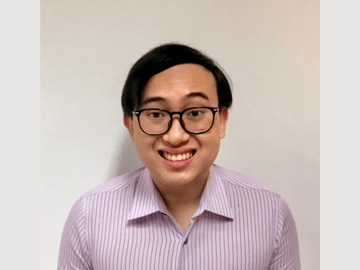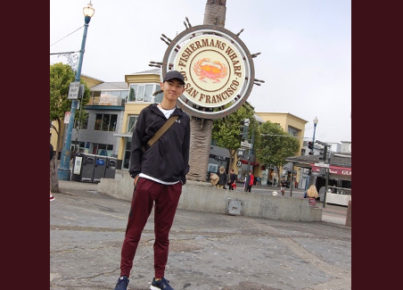“Overcoming and Finding Opportunities from Covid-19 Realities Now and Beyond”
Nelson Matthew P. Tan
University student (Philosophy)
Philippines
Early this year, I was very excited for my graduation from the United World College in Singapore and very eager to go to Harvard University in the United States to start college. But, due to the Covid-19 pandemic, all the milestone ceremonies that I looked forward were cancelled. Until now, I am deprived of the full experience of interacting personally with the professors and students of my new school. Nonetheless, these disappointing and limiting circumstances have not take away from me the immense privilege to work more closely with people from the ASEAN region, Asia as a whole, and all other regions in the world. Fortunately, I have adapted pretty well to make the most out of this online world. The new remote system has actually given me access to many more opportunities. I am able to join debate tournaments in different parts of the world such as the United Kingdom, Australia, and North America with no travel costs (and more importantly, no carbon footprints). I am able to attend so many online events with well-renowned speakers who during pre-Covid 19 times would not be able to travel as much in person due to their tight schedules. I am also able to actively participate in several climate action and government panels hosted by Harvard University. There are just so many occasions to connect with scientists and scholars from different disciplines from all over the world. For example, I recently spoke with the developers of the World Hunger Clock to discuss how their studies and statistical models can be used to tackle poverty and development. Indeed, many of these online opportunities I have taken advantage of are worth the many sleepless nights that would make me stay up until 3am!
Beyond the personal level, on a country or regional level, positive developments and empowering opportunities likewise present themselves. We have learned new ways of doing things with less materials and energy, leading to substantial positive environmental changes. We have seen how even ordinary people have gotten their acts together to extend assistance to those affected physically and economically by the pandemic. Scientists and government and non-government organizations across the world have collaborated in finding, designing and implementing programs and policies to contain the virus transmission and to mitigate its physical, social and economic effects. There are so many lessons to be learned from what is happening now, and these should be intensively and extensively examined and documented. Understanding all these will prepare us and equip us with ways to prevent another pandemic or to respond more efficiently and effectively should a new shock occur.
As a person who hopes to become a development economist and researcher, the present is the most crucial. I am keeping my eyes, mind and heart open, as much as I can, to understand the implications of these developments in the future world that I will have to work for and lead together with all my peers in TYCA and all other regions of the world. We have to look into how labour conditions, industrial structures, governance, poverty, and inequality determine the distribution of health and educational opportunities among the people, as these will dictate the kinds and degrees of impacts on specific groups of people within and across countries, and the policies and programs that are most needed. We must endeavor for the creation of sustainable cities and communities that will be less vulnerable and more resilient to shocks of similar or even more expansive effect as the present pandemic. I plan to focus my training and preparation on Southeast Asia as this is the region where I come from and which will always be closest to my heart. Apart from honing analytical skills and expertise, I will also continue to develop my skills in public speaking, so I may clearly explain to people from different walks of life what the important issues are and what can be done to address the root problems. Either as a policy-maker in government or a development specialist in non-government organizations, I should be able to persuade and move people to action. I can only accomplish this goal and make a difference if I have a clear understanding of the issues as well as the skills to communicate these with people. With regards to the current pandemic, I am aware that the losses and suffering brought about by Covid-19 in my country are most devastataing. The Philippines is among the worst hit in Southeast Asia. It has the highest cases of Covid-19, the highest mortality rate, and the most severe economic contraction. As of 7 December 2020, there have been 441,000 cases and 8,572 deaths (Covid-19 Philippines Update online). The ADB predicts that the Philippine economy will contract by 7.3% in 2020. The government has not been able to formulate and implement policies and programs to contain the spread of the pandemic. Despite indications of a developing pandemic as early as December 2019, it continued to allow entry of people from the original source of the virus until March 2020. It is only now that the highest office in the country is recognizing the need for mass testing. Further, health and livelihood assistance programs are riddled with corruption. It pains me to witness and be in the middle of all this. But, I am also thankful that I am in my beloved country at this time of crisis – being here exposes and immerses me in the issues, so I feel a deeper sense of urgency. I may not be able to take big and concrete steps now (apart from assisting my parents in their involvements in some environmental and relief programs in our church and small community), but I am starting to think and formulate analytical frameworks and tools for development policies for the Philippines and similar developing countries, with the classes I am taking at Harvard on Urban economics, R-programming and data analysis.
今年の初め、私はシンガポールのユナイテッド・ワールド・カレッジを卒業し、アメリカのハーバード大学に進学して大学生活をスタートさせることを心待ちにしていました。しかし、Covid-19のパンデミックの影響で、楽しみにしていた節目の式典はすべて中止になってしまいました。今に至るまで、私は新しい学校の先生方や学生との交流を十分に味わうことができません。けれども、嘆かわしく、制限されたこの状況が、ASEAN地域、アジア全体、そして世界の他の地域の人々とより密接に連携を図ることができるという、大きな特権を奪ったわけではありません。幸いなことに、私はこのオンラインの世界を最大限に活用するために、自分を適応させることができました。この新しいシステムのおかげで、実際に多くの機会を得ることができました。イギリス、オーストラリア、北米など、世界のさまざまな地域のディベートトーナメントに、旅費なしで参加できるようになりました。(そして、もっと重要なことは、二酸化炭素排出量が0だということです)今は、有名な講演者が出演するオンラインイベントに多く参加することができています。Covid-19以前の時代では、タイトなスケジュールのためにこのような方々はあまり旅をすることができませんでした。また、ハーバード大学が主催する気候変動対策や政府の諮問機関にも積極的に参加することができています。世界中の様々な分野の科学者や学者と交流する機会が多くあります。例えば、私は最近、ワールドハンガークロックの開発者と話をして、彼らの研究や統計モデルが貧困や今後の開発にどのように活用できるかを議論しました。言うまでもなく、私が利用したこのようなオンラインの催しの多くは、夜中の3時まで起きていなければならないこともあり、眠れない夜を過ごすこともありますが、非常に価値のあるものです。
個人レベルだけでなく、国や地域レベルでも、前向きな動きや、自己表現をするような、やる気を与える機会が提供されています。私たちは、より少ない資源とエネルギーで物事を行う新しい方法を学び、環境に大きなプラスの変化をもたらしました。一般の人々でさえ、パンデミックによって身体的にも経済的にも影響を受けた人々を支援するために行動を共にしています。世界中の科学者や政府機関、非政府組織が、ウイルスの感染を食い止め、身体的、社会的そして経済的な影響を軽減させるために、計画や施策を模索し、設計しそして実行するために協力しています。現在起こっていることから学ぶべき教訓は非常に多く、これらは集中的かつ広範囲で精査され、文書化されなければなりません。教訓を良くを理解することは、新たなパンデミックを予防するため準備や備えに繋がります。また、万が一新たな問題が発生した場合に、より効率的かつ効果的に対応できるようにもなるでしょう。
開発エコノミストと研究者になりたいと思っている者としては、今が最も重要です。私は、目を開き、心そして気持ちをできるだけオープンに保つようにしています。そうすることで、未来の世界における開発の意図を理解することができます。私は、TYCAや世界の他の地域のすべての仲間と連携を図り、未来のために協働したいです。私たちは、労働条件、産業構造、政治的統制、貧困、不平等が、健康と教育の機会の配分にどう作用しているのかをよく調べなければなりません。このようなことは、国内外を問わず、ある特定の集団に与えている影響の種類や、どの程度の影響を与えているのかを明確にするからです。そして、最も必要な政策や計画が何であるかを決定づけます。私たちは、現在のパンデミックと同じような、あるいはそれ以上の大きな衝撃に対して、脆弱でなく、回復力のある持続可能な都市やコミュニティの創造に向けて努力しなければなりません。私は東南アジアで生まれ育ったので、常にこの地域に親近感を抱いています。故に、私は東南アジアでの研修と準備に力を入れるつもりです。分析スキルや専門知識を磨くだけでなく、人前で話すスキルも磨きたいと思っています。そうすることで、異なった道を歩んできた人たちに対して、何が重要な問題で、根っこの問題を解決するためには、どうしなければならないかを明確に説明できるようになると思います。政府の政策立案者として、あるいは非政府組織の開発専門家として、人々を説得し、行動に移してもらうようにしなければなりません。 問題を明確に理解し、それを人々に伝えるスキルを持っていなければ、この目標を達成し、変化をもたらすことはできません。
現在のパンデミックに関しては、Covid-19が母国にもたらした損失と苦しみは非常に壊滅的なものです。フィリピンは東南アジアで最も被害が大きい国の一つです。フィリピンは症例数が最も多く、死亡率が最も高く、経済の収縮が最も激しい国です。2020年12月7日現在、感染者数は44万1,000人、死亡者数は8,572人となっています。(Covid-19 フィリピン最新情報 オンライン)アジア開発銀行(ADB)は、2020年のフィリピン経済は7.3%縮小すると予測しています。政府は、パンデミックの拡大を抑制するための政策や計画を策定し、実施することができていません。2019年12月には早くもパンデミックの兆候があったにもかかわらず、2020年3月まで政府はウイルスの原産地からの入国を許可し続けました。国の最高機関が大量検査の必要性を認識しているのは、今になって初めてのことです。さらに、保健と生活支援に関するプログラムは汚職にまみれているのです。このような状況を目の当たりにし、その真っ只中にいることは、私にとって苦痛です。しかし、この危機的な時期に愛する母国にいることに感謝しています。ここにいることで、問題を直視し、緊急対応の必要性を痛感できるからです。今は大きな具体的な行動はできないかもしれません。(環境活動に関わる両親の手伝いをしたり、教会や地域社会での活動を除きます)しかし、ハーバード大学で履修している都市経済学、Rプログラミング、データ分析などの授業で、フィリピンや同様の発展途上国の開発政策のための分析フレームワークやツールを考え、策定し始めています。








